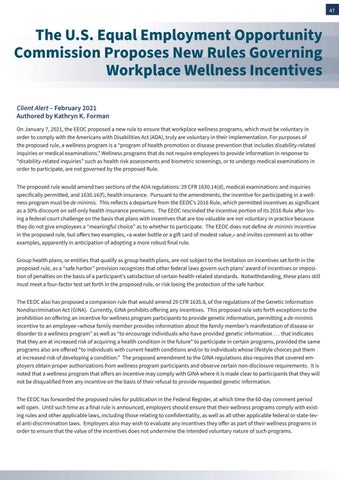47
The U.S. Equal Employment Opportunity Commission Proposes New Rules Governing Workplace Wellness Incentives Client Alert – February 2021 Authored by Kathryn K. Forman On January 7, 2021, the EEOC proposed a new rule to ensure that workplace wellness programs, which must be voluntary in order to comply with the Americans with Disabilities Act (ADA), truly are voluntary in their implementation. For purposes of the proposed rule, a wellness program is a “program of health promotion or disease prevention that includes disability-related inquiries or medical examinations.” Wellness programs that do not require employees to provide information in response to “disability-related inquiries” such as health risk assessments and biometric screenings, or to undergo medical examinations in order to participate, are not governed by the proposed Rule. The proposed rule would amend two sections of the ADA regulations: 29 CFR 1630.14(d), medical examinations and inquiries specifically permitted, and 1630.16(f), health insurance. Pursuant to the amendments, the incentive for participating in a wellness program must be de minimis. This reflects a departure from the EEOC’s 2016 Rule, which permitted incentives as significant as a 30% discount on self-only health insurance premiums. The EEOC rescinded the incentive portion of its 2016 Rule after losing a federal court challenge on the basis that plans with incentives that are too valuable are not voluntary in practice because they do not give employees a “meaningful choice” as to whether to participate. The EEOC does not define de minimis incentive in the proposed rule, but offers two examples, «a water bottle or a gift card of modest value,» and invites comment as to other examples, apparently in anticipation of adopting a more robust final rule. Group health plans, or entities that qualify as group health plans, are not subject to the limitation on incentives set forth in the proposed rule, as a “safe harbor” provision recognizes that other federal laws govern such plans’ award of incentives or imposition of penalties on the basis of a participant’s satisfaction of certain health-related standards. Notwithstanding, these plans still must meet a four-factor test set forth in the proposed rule, or risk losing the protection of the safe harbor. The EEOC also has proposed a companion rule that would amend 29 CFR 1635.8, of the regulations of the Genetic Information Nondiscrimination Act (GINA). Currently, GINA prohibits offering any incentives. This proposed rule sets forth exceptions to the prohibition on offering an incentive for wellness program participants to provide genetic information, permitting a de minimis incentive to an employee «whose family member provides information about the family member’s manifestation of disease or disorder to a wellness program” as well as “to encourage individuals who have provided genetic information . . . that indicates that they are at increased risk of acquiring a health condition in the future” to participate in certain programs, provided the same programs also are offered “to individuals with current health conditions and/or to individuals whose lifestyle choices put them at increased risk of developing a condition.” The proposed amendment to the GINA regulations also requires that covered employers obtain proper authorizations from wellness program participants and observe certain non-disclosure requirements. It is noted that a wellness program that offers an incentive may comply with GINA where it is made clear to participants that they will not be disqualified from any incentive on the basis of their refusal to provide requested genetic information. The EEOC has forwarded the proposed rules for publication in the Federal Register, at which time the 60-day comment period will open. Until such time as a final rule is announced, employers should ensure that their wellness programs comply with existing rules and other applicable laws, including those relating to confidentiality, as well as all other applicable federal or state-level anti-discrimination laws. Employers also may wish to evaluate any incentives they offer as part of their wellness programs in order to ensure that the value of the incentives does not undermine the intended voluntary nature of such programs.



















